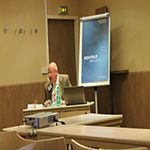Euroacademia Conferences
 Europe Inside-Out: Europe and Europeanness Exposed to Plural Observers (9th Edition) April 24 - 25, 2020
Europe Inside-Out: Europe and Europeanness Exposed to Plural Observers (9th Edition) April 24 - 25, 2020 Identities and Identifications: Politicized Uses of Collective Identities (9th Edition) June 12 - 13, 2020
Identities and Identifications: Politicized Uses of Collective Identities (9th Edition) June 12 - 13, 2020 8th Forum of Critical Studies: Asking Big Questions Again January 24 - 25, 2020
8th Forum of Critical Studies: Asking Big Questions Again January 24 - 25, 2020 Re-Inventing Eastern Europe (7th Edition) December 13 - 14, 2019
Re-Inventing Eastern Europe (7th Edition) December 13 - 14, 2019 The European Union and the Politicization of Europe (8th Edition) October 25 - 26, 2019
The European Union and the Politicization of Europe (8th Edition) October 25 - 26, 2019 Identities and Identifications: Politicized Uses of Collective Identities (8th Edition) June 28 - 29, 2019
Identities and Identifications: Politicized Uses of Collective Identities (8th Edition) June 28 - 29, 2019 The European Union and the Politicization of Europe (7th Edition) January 25 - 26, 2019
The European Union and the Politicization of Europe (7th Edition) January 25 - 26, 2019 7th Forum of Critical Studies: Asking Big Questions Again November 23 - 24, 2018
7th Forum of Critical Studies: Asking Big Questions Again November 23 - 24, 2018 Europe Inside-Out: Europe and Europeanness Exposed to Plural Observers (8th Edition) September 28 - 30, 2018
Europe Inside-Out: Europe and Europeanness Exposed to Plural Observers (8th Edition) September 28 - 30, 2018 Identities and Identifications: Politicized Uses of Collective Identities (7th Edition) June 14 - 15, 2018
Identities and Identifications: Politicized Uses of Collective Identities (7th Edition) June 14 - 15, 2018
The Role of “the Other” in Jacques Derrida’s Perception of the European Identity
-
-

-
Presentation speakers
- Martin Rodan, Hebrew University of Jerusalem, Israel
- Download presentation
Abstract:
The deconstruction of Jacques Derrida and his concept of “différance” seems to me particularly appropriated for a thorough examination of Europe and Europeaness exposed to plural observers. Derrida considered himself a real European because of his double internal and external appurtenance to Europe. He considered himself to be a European insider because he came from outside. He wrote in this context: “I feel, European in every part, that is, European through and through. By which I mean, by which I wish to say, or must say: I do not want to be and must not to be European through and through, European in every part. Being a part, belonging as ‘fully a part,’ should be incompatible with belonging in ‘every part.’ ” Derrida deals with the question of Europeaness in his two writings “The other heading” (L’autre cap) and “Call it a day for democracy” (La démocratie ajournée) written in 1990 in time of entire political uncertainty in Europe shortly after the fall of the wall in Berlin. I feel important to re-consider those Derrida texts again, more than twenty years after, when Europe seems to fall again into “uncertainty”, at this stage more economical than political. Derrida’s suggestions about Europe’s “headings” in the world, about its universalisms and particularisms and about the importance of what he calls “ideal capital” for the wellbeing of Europe are of surprising actuality. In my lecture I will pay special attention to Derrida’s definitions of “European duty not only to integrate (foreigners), but also to recognize and accept their alterity” and to the task of “outsiders” for ceaseless adjustments of European cultural challenges. I will in this context refer to my book “Notre culture européenne, cette inconnue” and mention the “internal” and “external” components of the European cultural identity.
-
Related Presentations

Euroscepticism Amongst Youth in Serbia and Croatia As An Extreme Form of Strategic Coalition
- Astrea Pejović and Jovana Papović

The Role of External Perceptions in the European Identity Formation
- Irina Khayrizamanova
















